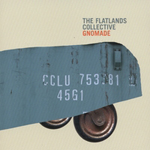|
|
 |
Dusted Reviews
Artist: The Flatlands Collective Album: Gnomade Label: Skycap Review date: Apr. 23, 2007 |

|
|
|
 |
Jorrit Dijkstra is Dutch, but if you listen to about three seconds of the first track you’ll peg Gnomade as a Chicago record. The opening track “Wire Tap’s” snappy elastic pulse, colorful harmonies, and bubbling brass commentary all sound like something out of the Vandermark 5’s songbook circa Simpatico, and that’s not just because two men (trombonist Jeb Bishop and drummer Tim Mulvenna) who played on that record are present here. In fact, every musician besides the leader is a member of the city’s post-AACM, non-mainstream, jazz and improv scene (stick that on a bumper sticker, kids).
But more importantly, Dijkstra seems to have come prepared to engage with the locale’s musical identify; his own compositions give the players plenty of chances to do what they’ve done before in the 5, the Valentine Trio, the Lucky 7s, and various other ensembles. The other writers in the band also contribute pieces that lay out significant facets of the Chicago sound. The way the astringent string and reed voicings in cellist Fred Lonberg-Holm’s “Alp Doodler” alternately melt and harden show how people around here aren’t afraid to drink from the late classical well, while bassist Jason Roebke’s “Longtones” shows how well those same elements mix with a melancholy, noir-jazz vibe. Bishop’s “Rabbits,” more bouncy than horny, represents the strongly tuneful yet historically attuned side that has led old Ellington lovers and indie-rock fans to compete for folding chairs in the same smoke-begrimed (but not for much longer) bars. Clarinetist James Falzone’s “The 4:08” is a highlight; it actually has more vigor and fire than anything else I’ve heard the guy do.
So where is Dijkstra in all this? On alto saxophone, he’s not an especially distinctive soloist; his most personal touches come in the electronic tones that subtly intensify the colors of the orchestrated passages and enliven the free-fall exchanges. That he accomplishes this with a lyricon, a wind-triggered synth I associated with Tom Scott and odious ’70s fusion, is especially impressive.
By Bill Meyer
|







